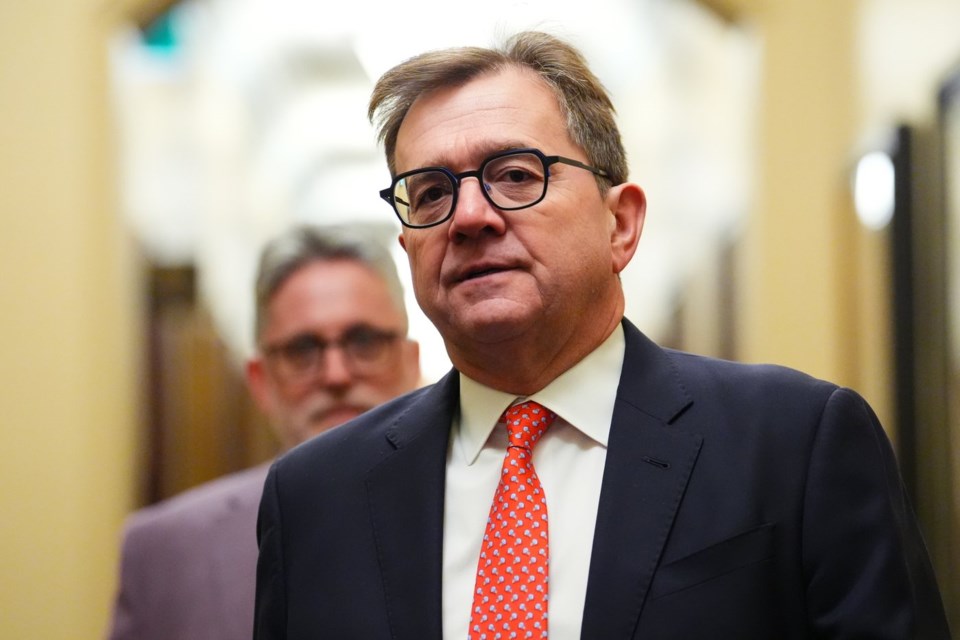WASHINGTON — Exactly what president-elect Donald Trump plans to do with his tariff threat remains a mystery to Canadian officials and most Republicans, Energy and Natural Resources Minister Jonathan Wilkinson said Thursday.
Wilkinson spent several days in Washington, D.C., this week meeting with congressional Republicans as his government tries to limit the damage from Trump's promise to sign an executive order Monday to hit Canada with 25 per cent across-the-board tariffs on all exports to the United States.
Wilkinson said a very small group of officials is crafting Trump's plans for executive orders.
"Even Republican senators and congresspeople and others who are quite close to the administration do not have a good read on exactly what the nature of a tariff might look like," Wilkinson told reporters on the final day of his trip Thursday.
Wilkinson met with Republicans Kevin Cramer, Ted Cruz, Bruce Westerman and Chuck Fleischmann, as well as Democrat John Hickenlooper. The minister also had meetings with energy policy experts.
Wilkinson said he's heard of three options being considered: 25 per cent tariffs, 10 per cent tariffs and a lower duty that ratchets up over time.
Trump initially said the tariffs were being imposed in response to drugs and illegal immigration crossing the shared border.
Ottawa responded with a $1.3-billion package to beef up the border, but Trump has since pivoted to citing the United States' trade deficit with Canada.
"In terms of what more he wants, I am not even sure that the president himself … fully knows exactly what he wants," Wilkinson said. "I think President Trump is somebody who is a proficient negotiator. I think this is about creating leverage."
There's been much debate across Canada on how the country should respond, but Wilkinson said the federal government will need to wait and see what tariffs are ultimately imposed.
Minister of Foreign Affairs Mélanie Joly also travelled to Washington this week.
Also on Thursday, Prime Minister Justin Trudeau formed a new 18-member Canada-U.S. relations council to support the federal government in dealing with the incoming administration.
Trudeau met with premiers in Ottawa Wednesday and almost all of the assembled leaders emerged with a commitment to a "Team Canada" approach in response to Trump.
Alberta Premier Danielle Smith broke from the pack, refusing to sign a joint statement. She posted on social media that Alberta will not agree to export tariffs on its energy or other products and will "take whatever actions are needed to protect the livelihoods of Albertans from such destructive federal policies."
On Thursday, she posted on X again to propose "a real Team Canada approach," demanding immediate construction of pipeline projects and a repeal of federal production caps and electricity regulations.
"Stop threatening the livelihoods of tens of thousands of Albertans and Canadians via an energy export tax or ban," Smith wrote.
Speaking to reporters at a press conference in Windsor, Ont., Trudeau said it was important for premiers to have the chance to express their interests. He said he doesn't blame Smith for speaking up for the energy industry.
"But every single premier other than Danielle Smith then chose to put Canada first," he said.
He added that "Canadian taxpayers bought the TransMountain pipeline expansion" and said the Alberta government is "making billions of dollars" in revenue from the project.
Trudeau also said he's "put aside the partisanship to a large degree" to fight for Canada in his remaining time as prime minister. His resignation takes effect after the Liberals choose a new leader on March 9.
" (Conservative Leader) Pierre Poilievre, who wants to be prime minister for all Canadians, has a choice to make. Either he stands up to fight for all Canadians alongside all premiers and the federal government that are doing that, or he chooses to stand with Danielle Smith, Kevin O'Leary and, ultimately, Donald Trump," Trudeau said.
At a press conference of his own in Delta, B.C., Poilievre repeated his demand for a federal election to put in place "a strong, stable national majority government that would stand up for all Canadians, all industries, in all provinces."
"I think the first thing President Trump will do when he takes office is to send a bouquet of flowers to the Liberals — Freeland, Carney and Trudeau — who have weakened and divided our country and given him the upper hand," he said, name-checking Liberal leadership hopefuls Chrystia Freeland and Mark Carney.
Poilievre refused to say whether he supports including energy products in Canada's retaliatory measures, whether through export taxes or a ban on exports.
He said the Liberal policies on pipelines have "forced Canadians to sell 100 per cent of our oil and gas to the Americans at discount prices" and said that if he were prime minister he would quickly approve energy projects to send Canadian energy to the rest of the world.
"I will also unite our country," he said, accusing the Liberals of trying to divide provinces "right at our moment of weakness."
Wilkinson said conflicting messages from Canadian leaders are causing confusion among American legislators and industry at a time when they need to receive a clear argument from Canada.
He called Smith's Wednesday statement unfortunate and criticized NDP Leader Jagmeet Singh's proposal to end critical mineral exports to the U.S.
Wilkinson said "the NDP leader honestly doesn't know what he's talking about."
"To be honest with you, Mr. Singh is not helping the cause of Canada by saying things like that publicly."
This report by The Canadian Press was first published Jan. 16, 2025.
— With files from Sarah Ritchie in Ottawa
Kelly Geraldine Malone, The Canadian Press



